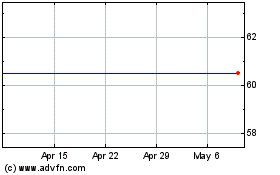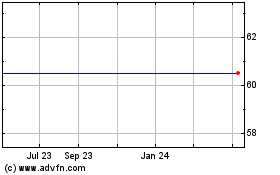Unilever Wants Bigger Bite of Plant-Based Market
November 17 2020 - 7:30PM
Dow Jones News
By Saabira Chaudhuri
The race to dominate the market for meat and dairy substitutes
is heating up with packaged-foods giants launching new products and
increasingly investing in alternative sources of protein.
Unilever PLC, owner of Ben & Jerry's ice cream and
Hellmann's mayonnaise, this week announced a target to increase its
sales of meat-and-dairy alternatives to $1.2 billion over the next
five to seven years -- a fivefold increase from current levels.
It plans to sell more vegan and dairy-free versions of its mayo
and ice cream and expand the Vegetarian Butcher, its
meat-alternatives brand that supplies soy patties and nuggets to
Burger King in Europe. It also is exploring algae as a potential
source of protein.
Unilever's move is the latest from a consumer-goods company
capitalizing on surging demand for products perceived as more
climate-friendly and humane. The global market for meat substitutes
is forecast to hit $23.81 billion by 2023, a 28% rise over last
year's sales, according to Euromonitor. The milk-substitutes market
will climb 23% over this period, the research firm estimates.
Unilever already sells vegan mayonnaise in 30 markets, and a
pea-protein based vegan Magnum ice cream, which it says have sold
well.
Nestle SA in September launched what it said was a plant-based
version of a bacon cheeseburger, using yellow pea protein for the
patty and plant-based fibers to resemble cheese. It has also
started selling an oat-and-pea nondairy version of its Nesquik
powdered drink in Europe.
Elsewhere, General Mills Inc. has invested in plant-based
alternatives to seafood, while Kellogg Co. recently launched a new
line of plant-based burgers, bratwurst and sausages. Danone SA,
which owns the Alpro and Silk dairy-substitute brands, said in May
it would create a new division dedicated to more than doubling its
plant-based sales to the equivalent of almost $6 billion a year by
2025.
The moves mean many of the world's largest food companies are
now jockeying with startups like Impossible Foods Inc. and Beyond
Meat Inc. for a foothold in a plant-based market that is growing
much faster than that for traditional meat. Seeking an edge,
companies are searching for protein sources -- beyond existing
alternatives like pea, rice mung bran and faba bean -- that can
offer lots of nutrients with a low environmental footprint.
Unilever has high hopes for a microalgae called chlorella
vulgaris, which it says is rich in nutrients. The problem so far is
that chlorella vulgaris tastes bitter because it is high in
chlorophyll -- the pigment that gives plants their color --
hindering mainstream adoption. Unilever has invested in a biotech
startup, Algenuity, that says it can reduce the chlorophyll content
of microalgae without reducing the nutrients.
"It's definitely worth experimenting with given it's such an
excellent source of protein in food," Hanneke Faber, head of
Unilever's food business, said in an interview. Algae could be used
in Unilever's ice cream or soup, she added but said it was too soon
to tell.
One concern for companies, including Unilever, is whether
consumers will take to these lesser-used protein sources -- what
Ms. Faber calls "the yuck factor." She previously worked at Stop
& Shop owner Koninklijke Ahold Delhaize NV when the company
experimented with using insect protein but says ultimately it
didn't take off because consumer acceptance was low. "That's our
challenge too," she said.
Another big hurdle for Unilever and others developing
meat-and-dairy substitutes are the legal challenges posed by these
industries.
Last month, the European Parliament ruled that meatless products
can continue to label themselves sausages, steaks or burgers,
rejecting a meat-industry backed proposal to disallow this because
it is misleading.
Ms. Faber said she was disappointed by a less-favorable ruling
saying nondairy products can't use terms like "cheese" or "milk,"
even as reference points for consumers. "Those things are really
important because they are nudges" that encourage consumers to
switch over, she said.
Write to Saabira Chaudhuri at saabira.chaudhuri@wsj.com
(END) Dow Jones Newswires
November 17, 2020 19:15 ET (00:15 GMT)
Copyright (c) 2020 Dow Jones & Company, Inc.
Unilever NV (NYSE:UN)
Historical Stock Chart
From Oct 2024 to Nov 2024

Unilever NV (NYSE:UN)
Historical Stock Chart
From Nov 2023 to Nov 2024
